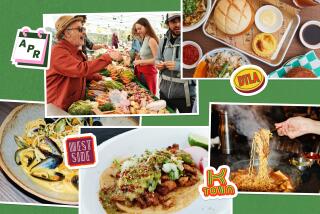The fruits and veggies of success
When Lorraine Tenerelli tried to get her husband to bring their peaches to sell at Los Angeles County’s first farmers market 30 years ago, he didn’t want to be bothered. But he tagged along with her to a church parking lot in Gardena.
“When he saw the mob of customers, he said, ‘We’ve got to plant more,’ ” Tenerelli said Thursday at the weekly farmers market outside City Hall. There, Mayor Antonio Villaraigosa and other officials joined with farmers, market organizers and some of the city’s best-known chefs to celebrate the anniversary and the growth of farmers markets to a total of 121 today -- more than any other county in the country, the mayor said.
The celebration ranged from serious to fun, including a salsa contest -- the eating kind, not the dancing kind -- plus chef demonstrations and plenty of food vendors, naturally.
Villaraigosa also announced a food policy task force that will “help turn L.A. into the farmers market capital of the world.”
“When you think of it, what is more important than the food we put on our table?” he said.
Every week, 1,000 farmers and food producers sell their wares to about 250,000 shoppers in L.A. County markets, he said, adding later that he shops at the Sunday market in the Larchmont neighborhood.
The work and membership of the task force, in which the city is partnering with Occidental College and the L.A. Conservation Corps, have yet to be decided, Deputy Mayor Larry Frank said. But among the issues it will consider are school food; access by the poor to fresh, nutritious food; the environment; and a permanent market hub, he said.
“Everyone should have access to good food,” said Evan Kleiman, chef-owner of Angeli Caffe, host of the radio show “Good Food” and emcee of Thursday’s event. “We may have moved to the city, but we still want to eat like we live on the farm.”
On June 23, 1979, only four farmers showed up at that church parking lot in Gardena, six fewer than organizer Vance Corum had hoped for. But more soon followed.
Take Jim Tamai, who grew strawberries in Oxnard -- some of the best in the country, according to Corum. Tamai’s farm was in trouble, and he had already started laying off workers.
Then he heard that the farmers at the Gardena market were making a brisk profit. “ ‘You’ve got to get in here. The customers just love us,’ ” his brother, also a farmer, told him, as related by Corum.
The money from the first weeks enabled Tamai to keep his farm, which later diversified to grow other produce. Today, his son Steve and grandsons sell produce at 40 markets a week, from San Jose south to Seal Beach, Steve Tamai said.
The early markets were “an extremely elegant solution” at a time when farmers were feeling squeezed out by regulations and economics, said Jim Churchill, who grows and sells pixie tangerines in Ojai.
When the Tenerellis took their peaches to a wholesale market, they were told the price per box that the buyers would pay. At farmers markets, they set the price, Lorraine Tenerelli said.
“It’s been a godsend for all the farmers,” she said. Her husband, Peter, died seven years ago, but their son, John, sells stone fruit at 22 markets.
The first five markets in Southern California were sponsored by the Interfaith Hunger Coalition, with the goal of helping small farmers sell their produce and poor people buy it, Corum said. Today, some markets accept food stamps and Women, Infants and Children program coupons, but Corum said much more work is needed to provide good, affordable food to everyone.
Also part of the anniversary celebration was a competition for ideas and avenues to make farm food easily available to urban dwellers.
The winning entry, from Mia Lehrer & Associates in Los Angeles, called for a hub market where farmers could sell their produce and a fleet of electric trucks to take it to neighborhoods and sell it. Astrid Diehl, one of the designers, said the idea takes advantage of that “culture of taco trucks and mobile libraries.”
--
More to Read
Eat your way across L.A.
Get our weekly Tasting Notes newsletter for reviews, news and more.
You may occasionally receive promotional content from the Los Angeles Times.







